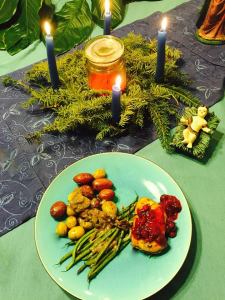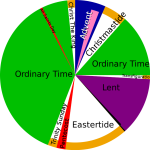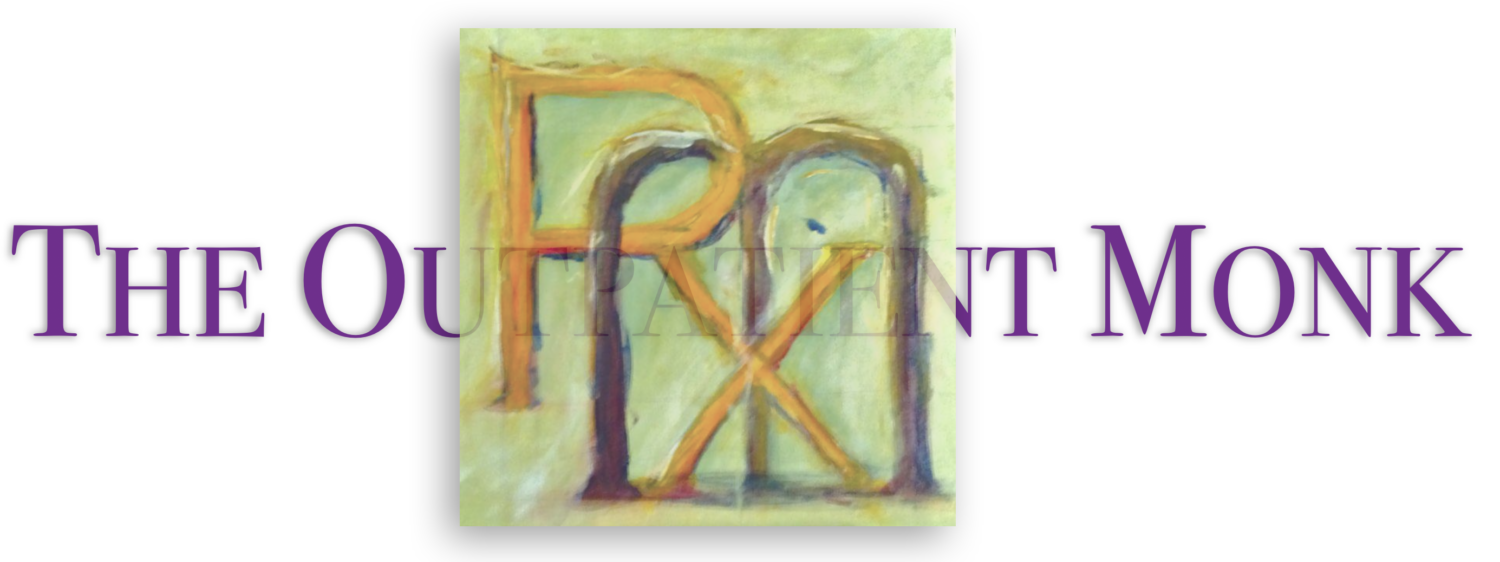Last updated on January 7, 2015
 This year, my experience of the holidays was…. not ideal. In short: I just stayed sick most the time. I ended up in bed on Thanksgiving, on Christmas and again on Epiphany. And while I had to cancel my normal plans to stay by myself in a cabin at the State Park for Christmas, I did have some good friends who at least managed to haul my feeble body to church for Christmas eve services. I spent most of Christmas day with the blankets up to my chin and 30 Rock on Netflix. I could have stayed there in bed all day, occasionally checking for signs of life on FaceBook and otherwise not really needing much more than my Vicks vapor rub and my water bottle.
This year, my experience of the holidays was…. not ideal. In short: I just stayed sick most the time. I ended up in bed on Thanksgiving, on Christmas and again on Epiphany. And while I had to cancel my normal plans to stay by myself in a cabin at the State Park for Christmas, I did have some good friends who at least managed to haul my feeble body to church for Christmas eve services. I spent most of Christmas day with the blankets up to my chin and 30 Rock on Netflix. I could have stayed there in bed all day, occasionally checking for signs of life on FaceBook and otherwise not really needing much more than my Vicks vapor rub and my water bottle.
I am sure it won’t surprise you to find out that FaceBook is particularly bad company for Christmas but I was nevertheless struck by the interminable amount of snark, cheap irony, and, of course, culture war bashing. At first it left me just irritated, and frankly a little bored, but after laying there a few hours I began to develop a sense of sadness, that in fact, this is all we really knew how to do.
It seems to me that everything in the late nineties seemed to have quotes around it. It was the true age of irony. Every movie title, every band name was meant to say one thing but mean its opposite. I remember watching movie “American Beauty,” and thinking to myself, “Oh, I get it, the American dream failed and now we are mourning it.”
it. It was the true age of irony. Every movie title, every band name was meant to say one thing but mean its opposite. I remember watching movie “American Beauty,” and thinking to myself, “Oh, I get it, the American dream failed and now we are mourning it.”
If that was the age of irony, then it is the last few years that we have all become hipsters and instead of being ironic, like we claim to be, we are actually just sarcastic, and even tragic.
We like to say things and to say them boldly and we feel line doing it because there is always the chance that we actually mean the opposite. Never before have I thought so much about “Poe’s Law” and the constant difficulty people have distinguishing between news and parody. A decade a go we mourned the death of the American dream, but lately it seems we just point at its corpse and laugh.
At least, that is what it felt like on Christmas day. By evening I found myself struggling to believe it really was actually Christmas day. It was not that I was having a bad Christmas day, it just seemed like all of the language about cheer, hope, kindness goodness, might as well have been nostalgia, or sarcasm as much as it could have been actual hope. Was any of it real?
I couldn’t stop thinking about a book I read in school, (which I can’t really recommend because it is nearly impenetrable and jammed full of academic lingo). It is Catherine Pickstock’s After Writing, and in it she takes on several modern and post modern philosophers who like to argue that language does in fact, tend to slip out of place, and as hard as we try to keep saying things and meaning things, eventually nothing really holds.
That all gets dense but I felt like I was watching it happen. No one could post  Happy Holidays or Merry Christmas without me having to at least concede the possibility that they were actually being snarky in their tone, and that what they meant was the opposite. “Only my holiday matters,” or “Don’t you love how we have to be politically correct,” or, “There is no way in hell I will actually let any hint of Christmas show up in my vocabulary.” Both sides of the culture wars having bee duking it out, so I had to wonder, was it actually even Christmas?
Happy Holidays or Merry Christmas without me having to at least concede the possibility that they were actually being snarky in their tone, and that what they meant was the opposite. “Only my holiday matters,” or “Don’t you love how we have to be politically correct,” or, “There is no way in hell I will actually let any hint of Christmas show up in my vocabulary.” Both sides of the culture wars having bee duking it out, so I had to wonder, was it actually even Christmas?
So that is when I decided to do something I absolutely did not feel like doing. I pulled myself out of bed, put on my Christmas sweater that Karen gave me in high school (it was really big on me at the time), and I hauled my butt into the kitchen to cook up some duck. Yes duck.
 I made the cranberry sauce, I roasted the potatoes, I made the mushroom gravy and seared the duck. I plopped it all down in my dining room table, unwrapped the baby Jesus, who I keep in wrapping paper and bows till the 25th, and sat down to force myself to feast.
I made the cranberry sauce, I roasted the potatoes, I made the mushroom gravy and seared the duck. I plopped it all down in my dining room table, unwrapped the baby Jesus, who I keep in wrapping paper and bows till the 25th, and sat down to force myself to feast.
I lit all four Advent candles and turned to a Christmas prayer by St. Augustine:
Let the just rejoice, for their justifier is born.
Let the sick and infirm rejoice, for their saviour is born.
Let the captives rejoice, for their Redeemer is born.
Let slaves rejoice, for their Master is born.
Let free men rejoice, for their Liberator is born.
Let All Christians rejoice,
For Jesus Christ is born.
I said amen, and I ate. I did not feel like eating, but I ate.
I was still a little sad throughout my meal, there was no ABC Family Christmas miracle to turn the day around. I just ate, and prayed and for awhile just kept praying.
Lord, you know what it means to be vulnerable
A fragile young life, a defenseless young babe
So may this heart be vulnerable and open
This Christmas with Christ, walking closer each day
And when I was done I went back into my bedroom, put on 30 Rock, and pulled the blankets back up to my chin.
Catherine Pickstock says to the modern philosophers that, sure, language would be the senseless and would slip out of place entirely except the language of our prayers, the sounds of our liturgies, the words of our praise… do not.
A prayer spoken always finds its home. And as soon as it does it must be spoken again and again no matter how imperfectly for we are always being drawn more deeply in to the infinite love of an infinite God.
Today, on Epiphany, I am fully aware that there is still strife in Ferguson, war in Syria, hunger in Alabama and Ebola in Sierra Leone. I am not suspending any of those cares or concerns, but quite the opposite. I gather them into my prayers and feel free to admit that the world is unfinished, broken and yearning… and that some I am. Those words will find their home.
 In the Church calendar there are seasons set aside for fasting and giving things up. There are also seasons set aside for feasting and for praise. I have learned to try to appreciate the disciple of fasting – as hard as it is – and accept that I don’t get to choose when those times are. This Christmas I also learned that there is a discipline to joy, to feasting, and lifting our Alleluias. I don’t always get to choose those times either and I may not always be in the mood for it, but in a world of sarcasm, parody, irony, snark, and tragedy it is good to make a point to say something that actually goes somewhere, even if you have trouble meaning it: May God be praised.
In the Church calendar there are seasons set aside for fasting and giving things up. There are also seasons set aside for feasting and for praise. I have learned to try to appreciate the disciple of fasting – as hard as it is – and accept that I don’t get to choose when those times are. This Christmas I also learned that there is a discipline to joy, to feasting, and lifting our Alleluias. I don’t always get to choose those times either and I may not always be in the mood for it, but in a world of sarcasm, parody, irony, snark, and tragedy it is good to make a point to say something that actually goes somewhere, even if you have trouble meaning it: May God be praised.
